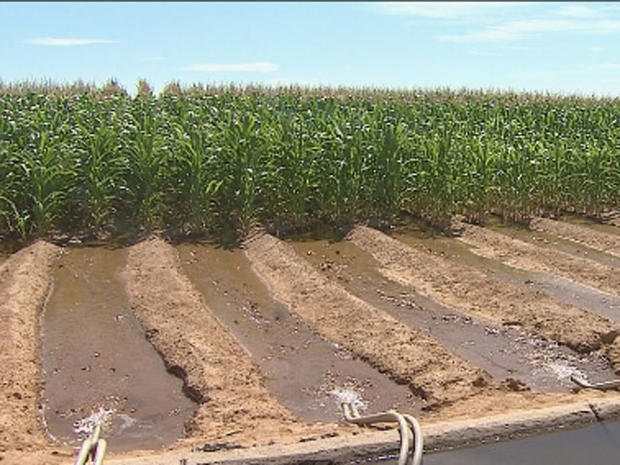State To Study Level Of PFAS Toxins Reaching Colorado's Crops
(CBS4) -- State agencies are assessing new data compiled by Colorado researchers that suggests a family of toxic chemicals could be reaching the state's vegetables - and potentially consumers - through contaminated irrigation.
The Colorado Department of Public Health and Environment and the Colorado Department of Agriculture are examining the potential contamination of irrigation waterways in areas that have previously been tested for contamination of drinking water.
RELATED Report: 'Forever Chemicals' Contaminate Drinking Water In Dozens Of Cities
In July, CDPHE announced the results of extensive testing of the state's water sources for PFAS, or perfluoroalkyls and polyfluoroalkyls substances. PFAS have been dubbed "forever chemicals," a reference to their resistance to decay. They are widely used in consumer products and industry applications due to their resistance to oil, grease, water and heat, as stated by the U.S. Food and Drug Administration. Notably used in Teflon, they more recently came to be known for their use in older firefighting foams used at airports, particularly following water testing downstream from those facilities.
U.S. commercial airports are required to phase out use of firefighting foam containing PFAS by 2021 by order of the Federal Aviation Administration. U.S. military bases have been instructed by Congress to phase out its use by 2024.
CDPHE's sampling earlier this year accounted for about half of the drinking water systems in the state serving around three-quarters of the population, according to the state health department. The department found four locations tested above healthy limits established by 2016 guidelines set by the Environmental Protection Agency.
However, varying levels were found in every waterway that was tested.
"All of the samples collected had some detectable level of the chemicals," CDPHE stated via news release in July. "The sample collected at the mouth of Sand Creek in Commerce City was above the EPA drinking water health advisory, but the state isn't aware of anyone directly drinking this affected water. Nonetheless, high levels of the chemicals in streams can impact downstream drinking water supplies since they don't break down."
Only one farm was found to be using water with high levels of the chemicals during the state's sampling of drinking water. Per the joint press release from the health and agriculture departments, that farm has since changed its operations.
RELATED Chemical Found In Firefighting Foam Discovered In Water Supply
RELATED Water Contamination Likely Came From Military Base
RELATED Air Force, State Health Department To Test Water Around Buckley AFB
RELATED Tests Show Toxic Chemical At Acceptable Levels At Air Force Academy
A recent study by researchers at the Colorado School of Mines modeled the likelihood of the elements to make their way through irrigation systems and into edible plants. The study, based on simulations, indicated "that eating lettuce watered with contaminated irrigation water may put people at risk for harmful health impacts," CDPHE stated in a November press release.
Juliane Brown, an environmental engineering PhD candidate at Mines who led the research, said, "While there has been an emphasis on identifying and cleaning up drinking water impacted by PFASs, much less attention has been given to assessing risks from consuming produce irrigated with PFAS-contaminated water. This study brings much needed attention to this issue and highlights the potential risks associated with this critical exposure pathway."
Christopher Higgins, professor of civil and environmental engineering at Mines and senior author of the study, added, "Even when drinking water has been treated and is considered safe, there is a potential for exposure from vegetables irrigated with contaminated water or grown in contaminated soil. This study shows that regulations that solely target perfluorooctane sulfonate (PFOS) and perfluorooctanoic acid (PFOA) in drinking water are inadequate to protect human health risks from PFASs."
Conclusive research on the implications of human consumption of PFAS is still developing, but impacts to health are acknowledged. An agency of the U.S. Department of Health and Human Services recently cited evidence of PFAS contributing to reduced ability of the immune system's resistance to COVID-19.
"These chemicals are present throughout our environment," said Kristy Richardson, state toxicologist, CDPHE, "and Colorado is committed to using the best available science to continually refine our recommendations. A key priority is to reduce exposure to these chemicals wherever they occur."
CDPHE recommends anyone using well water for drinking or gardening should have it tested.
The School of Mines study was published Nov. 17th in "Environmental Science And Technology." The research was supported, in part, by the National Science Foundation Graduate Research Fellowship and the U.S. Environmental Protection Agency.






